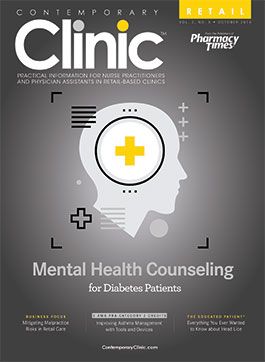Rite Aid RediClinic’s Sonia Rupani, MS, PA-C
Physician assistant Sonia Rupani, MS, PA-C, has demonstrated a passion for improving patient health throughout her entire life.

Physician assistant (PA) Sonia Rupani, MS, PA-C, has demonstrated a passion for improving patient health throughout her entire life.
Rupani’s drive to help others was apparent even in her youth, when her parents observed the care she took and compassion she displayed in tending to her sister’s wounds. Later, this inclination grew into a career aspiration after she met and shadowed a local PA, Mr. Shah; upon seeing the many positive effects that her mentor had on their community, Rupani decided to follow in his footsteps as a PA.
“Like other PAs, I wanted to make a difference on the well-being of my patients, and to provide quality care to patients all ages,” Rupani toldContemporary Clinic.
In pursuit of her career, Rupani graduated with a BS in chemistry from the University of Mumbai before moving to the United States, where she enrolled in and completed the PA program at John H. Stroger Jr. Hospital of Cook County in Chicago, Illinois. She later earned her MS in advanced physician assistant studies from A.T. Still University in Mesa, Arizona.
After becoming a licensed PA in 2010, Rupani put her skills and knowledge into practice as a clinician for Medinet Family Care Clinic in Houston, Texas, where she conducted physical exams, developed treatment plans, and provided counseling on preventive care. After several years, Rupani moved into her current position as a PA for a Rite Aid Rediclinic in Sugarland, Texas, a setting that has enabled her to perform further responsibilities such as administering immunizations and conducting travel consultations.
Although Rupani has treated many patients throughout her career, she nevertheless remains modest in her achievements, attributing her successes as a PA to the efforts of her fellow health care professionals.
“No matter where we practice—whether at a hospital, an emergency room, an outpatient clinic, or a retail clinic—it is teamwork that makes a difference,” Rupani said. “Efficient and adept teamwork has an impact on patient care and patient outcome.”
Reflecting on her career as a PA, Rupani expressed gratitude for her opportunities to help her patients improve their health and, ultimately, emphasized the crucial role that clinicians play on the health care team.
“Although the scope of practice at the retail clinics is limited, there are no restrictions applied to your knowledge in recognizing ailments and conditions in directing your patients to an appropriate provider, if needed,” Rupani stated. “It is rewarding to know you have helped a patient achieve the right care at the right time.”
Q: What do you think is the most important quality for a health care provider to possess?
A:The recipe to becoming a good health care provider contains many different ingredients, including professionalism, knowledge, empathy, compassion, thoroughness, respect, honesty, responsibility, and much more. However, one paramount spice in this recipe is being a good listener. It is important we listen to our patients to understand their concerns, as this act will guide us in getting a better understanding of their condition and allow us to provide them the appropriate quality care they deserve.
Q: Is there a specific person or patient you have worked with who taught you something that will help you be a better provider?
A:Yes, one of my teachers, the late Dr. Gertude Novak. She was a pathologist who went back into a family medicine residency program because of her interest to learn, and she never felt embarrassed to say “I do not know.” She taught me how to care for everyone with dedication, and how to experience the satisfaction that comes from improving outcomes. Even though she is no longer with us, the knowledge and characteristics she instilled in me and her other students has remained.
Q: What do you think is the most important issue in the medical field today? Why?
A:The most important issue in the medical field is the limited time and attention we invest in discussing prevention. A modifiable risk factor, obesity, is a growing concern in all age groups. We need to capitalize our time in educating patients and parents about therapeutic lifestyle changes to avoid the complications such as cardiovascular disease, diabetes, cancer, and much more.
Q: What advice would you give to aspiring PAs?
A:Year after year, dedicated and determined PAs have played a significant role in expanding and improving health care. My advice to aspiring PAs is to continue our devotion, hard work, and enthusiasm in providing quality care to the patients to make the world a healthier place.

Knock Out Aches and Pains From Cold
October 30th 2019The symptoms associated with colds, most commonly congestion, coughing, sneezing, and sore throats, are the body's response when a virus exerts its effects on the immune system. Cold symptoms peak at about 1 to 2 days and last 7 to 10 days but can last up to 3 weeks.
COPD: Should a Clinician Treat or Refer?
October 27th 2019The Global Initiative for Chronic Obstructive Lung Disease (GOLD) defines the condition as follows: “COPD is a common, preventable, and treatable disease that is characterized by persistent respiratory symptoms and airflow limitation that is due to airway and/or alveolar abnormalities usually caused by significant exposure to noxious particles or gases.â€
Diabetic Ketoacidosis Is Preventable With Proper Treatment
October 24th 2019Cancer, diabetes, and heart disease account for a large portion of the $3.3 trillion annual US health care expenditures. In fact, 90% of these expenditures are due to chronic conditions. About 23 million people in the United States have diabetes, 7 million have undiagnosed diabetes, and 83 million have prediabetes.
What Are the Latest Influenza Vaccine Recommendations?
October 21st 2019Clinicians should recommend routine yearly influenza vaccinations for everyone 6 months or older who has no contraindications for the 2019-2020 influenza season starting at the end of October, according to the Advisory Committee on Immunization Practices.
What Is the Best Way to Treat Pharyngitis?
October 18th 2019There are many different causes of throat discomfort, but patients commonly associate a sore throat with an infection and may think that they need antibiotics. This unfortunately leads to unnecessary antibiotic prescribing when clinicians do not apply evidence-based practice.
